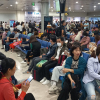Laborers residing in eight districts and towns in northern and central Vietnam are now eligible to register for a program to work in South Korea.
They are Chi Linh Town of the northern Hai Duong Province, Dong Son and Hoang Hoa districts in central Thanh Hoa Province, Cam Xuyen and Nghi Xuan districts in central Ha Tinh Province, Nghi Loc and Hung Nguyen districts and Cua Lo Town in central Nghe An Province, the Center of Overseas Labor under the Ministry of Labor, Invalids and Social Affairs said.
Laborers meeting certain requirements regarding ages and health can now register for the Korean language test at the end of January under the Employment Permit System (EPS).
For the 2023 exam, workers from the eight towns and districts were temporarily banned from recruitment after South Korea found over 70 Vietnamese from those localities were staying illegally in the country and 27% of laborers who are residents of those localities had not returned to Vietnam after their working contracts expired.
By now, those localities have been able to reduce the rate of illegal residency.
The registration period for the exam is from Jan. 26-30, and the Korean language proficiency test will be held from March 5 to June 14, applicable to workers nationwide.
However, candidates with relatives such as parents, spouses, children, or siblings residing illegally in South Korea will not be allowed to take the test.
The exam is expected to select over 15,400 workers for employment in various sectors, specifically over 11,200 in manufacturing, 200 in construction, nearly 900 in agriculture, and about 3,000 in fishing.
For the EPS Program, South Korean employers will choose workers based on randomly introduced profiles, without any direct influence on the contract signing process.
Therefore, workers passing two rounds of exams and submitting their applications are not guaranteed selection for work in South Korea, nor can they predict their departure time.
Candidates must be aged 18-39 and have never been expelled from South Korea. Those who illegally stayed in the past, but willingly returned to Vietnam, must be able to present documents as proof.
Those working for the agriculture and fishery sectors have extra requirements: being of an ethnic minority and living in one among 128 poor districts and communes on the coasts and islands for 2021-2025.
In the first nine months of 2023, the rate of Vietnamese workers residing illegally in South Korea increased by 34.5%, while the commitment rate agreed by South Korea and Vietnam is 28%.
Hai Duong, Lang Son, Nam Dinh, and Vinh Phuc are among the localities with rates ranging from 33-37%.
Both governments have implemented various measures to prevent absconding, such as Vietnam requiring laborers to deposit VND100 million (US$4,120) when registering for the EPS program and banning laborers from returning to work in South Korea for two-five years depending on the violations.
South Korea stipulates that employers using illegal foreign workers will face a three-year recruitment ban; offending workers may face imprisonment or a fine of 30 million won ($22,730).
South Korea also reconsiders the recruitment quota for the following year for countries with a high number of absconding workers.
- Reduce Hair Loss with PURA D’OR Gold Label Shampoo
- Castor Oil Has Made a “Huge” Difference With Hair and Brow Growth
- Excessive hair loss in men: Signs of illness that cannot be subjective
- Dịch Vụ SEO Website ở Los Angeles, CA: đưa trang web doanh nghiệp bạn lên top Google
- Nails Salon Sierra Madre
 VnExpress News The News Gateway of Vietnam
VnExpress News The News Gateway of Vietnam




